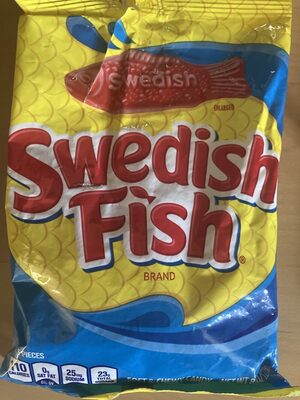
Barcode: 070462035988
Swedish Fish
HALAL
📝 Reason: Swedish Fish ingredients do not contain any listed Haram ingredients or Ecodes. Most ingredients are plant-based or synthetically produced and regarded as Halal by trusted sources. However, the source of ‘natural and artificial flavor’ is not specified, and such ingredients can sometimes include alcohol or animal derivatives, thus raising doubt. As per strict Halal rules, any doubtful ingredient renders the product Doubtful (Quran 5:3, IFANCA guidance).
🏷️ Category: Snacks, Sweet Snacks, Confectioneries, Candies
📄 Certificates: N, /, A, Vegetarisch, Vegan
Ingredients:
Details
Exploring the Halal Status of Swedish Fish
When it comes to sourcing Halal snacks, consumers are often on the lookout for options that meet their dietary needs while still being delicious. One popular candy that raises questions regarding its Halal status is Swedish Fish. In this post, we’ll examine the ingredients of Swedish Fish to determine if it’s truly Halal and to provide clarity on its components.
Halal Certification Overview
Swedish Fish is classified under snacks, specifically falling into the category of sweet snacks and confectioneries. Halal status, in particular, requires that all ingredients are free from Haram (forbidden) substances and meet Islamic dietary laws. According to the short explanation based on trusted sources, Swedish Fish appears Halal, yet some components necessitate further exploration.
Ingredients Breakdown
The primary ingredients of Swedish Fish include:
- Sugar: Generally accepted as Halal unless processed with bone char, which is rare.
- Invert Sugar: Made from plant sources, it’s considered Halal.
- Corn Syrup: Derived from corn starch and regarded as Halal.
- Modified Corn Starch: Almost always plant-based, this ingredient is typically considered Halal.
- Citric Acid: Commonly derived from plants, making it Halal.
- Sunflower Oil: As a vegetable oil, it is Halal.
- Natural and Artificial Flavor: This is where some concern arises, as it can be derived from animal, plant, or synthetic sources. Without detailed sourcing, its Halal status remains doubtful.
- Carnauba Wax: Plant-based and considered Halal, derived from palm leaves.
- Red 40: A synthetic dye that is Halal.
The Doubtful Ingredient: Natural and Artificial Flavor
While most ingredients in Swedish Fish are Halal, the ambiguous nature of ‘natural and artificial flavor’ creates uncertainty. This component could potentially include elements derived from Haram sources, which causes concern for strict consumers. The Quran 5:3 emphasizes the importance of avoiding doubtful matters regarding food consumption. To aid in your decision, we recommend consulting reliable sources or certifying bodies that might have detailed information on the origins of these flavors.
E-Numbers and Their Status
In addition to the listed ingredients, several E-numbers or additives are relevant to our assessment:
- Red 40: Known as Allura Red AC, this is a synthetic food dye and is considered Halal according to resources such as halalguide.info.
For the other ingredients, you can rest assured that they uphold Halal certification and contribute positively to the overall standing of Swedish Fish as a dietary option.
Conclusion: Is Swedish Fish Truly Halal?
In summary, Swedish Fish is largely composed of ingredients deemed as Halal by various stakeholders in dietary practices. The primary concern lands on the source of ‘natural and artificial flavors,’ which could potentially negate its Halal standing. Consumers are encouraged to stay updated, check specific product labels, and, when available, opt for certified Halal products. Knowledge is power, especially when it comes to ensuring our choices align with our beliefs!
As a popular choice in the realm of candies, Swedish Fish offers a sweet taste while sparking important discussions on food transparency and Halal principles. Be sure to share your insights and experiences regarding this beloved candy!
